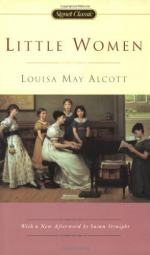The old lady couldn’t resist her longing to see her nephew, for she had met Laurie as she took her airing, and hearing of Mr. March’s arrival, drove straight out to see him. The family were all busy in the back part of the house, and she had made her way quietly in, hoping to surprise them. She did surprise two of them so much that Meg started as if she had seen a ghost, and Mr. Brooke vanished into the study.
“Bless me, what’s all this?” cried the old lady with a rap of her cane as she glanced from the pale young gentleman to the scarlet young lady.
“It’s Father’s friend. I’m so surprised to see you!” stammered Meg, feeling that she was in for a lecture now.
“That’s evident,” returned Aunt March, sitting down. “But what is Father’s friend saying to make you look like a peony? There’s mischief going on, and I insist upon knowing what it is,” with another rap.
“We were only talking. Mr. Brooke came for his umbrella,” began Meg, wishing that Mr. Brooke and the umbrella were safely out of the house.
“Brooke? That boy’s tutor? Ah! I understand now. I know all about it. Jo blundered into a wrong message in one of your Father’s letters, and I made her tell me. You haven’t gone and accepted him, child?” cried Aunt March, looking scandalized.
“Hush! He’ll hear. Shan’t I call Mother?” said Meg, much troubled.
“Not yet. I’ve something to say to you, and I must free my mind at once. Tell me, do you mean to marry this Cook? If you do, not one penny of my money ever goes to you. Remember that, and be a sensible girl,” said the old lady impressively.
Now Aunt March possessed in perfection the art of rousing the spirit of opposition in the gentlest people, and enjoyed doing it. The best of us have a spice of perversity in us, especially when we are young and in love. If Aunt March had begged Meg to accept John Brooke, she would probably have declared she couldn’t think of it, but as she was preemptorily ordered not to like him, she immediately made up her mind that she would. Inclination as well as perversity made the decision easy, and being already much excited, Meg opposed the old lady with unusual spirit.
“I shall marry whom I please, Aunt March, and you can leave your money to anyone you like,” she said, nodding her head with a resolute air.
“Highty-tighty! Is that the way you take my advice, Miss? You’ll be sorry for it by-and-by, when you’ve tried love in a cottage and found it a failure.”
“It can’t be a worse one than some people find in big houses,” retorted Meg.
Aunt March put on her glasses and took a look at the girl, for she did not know her in this new mood. Meg hardly knew herself, she felt so brave and independent, so glad to defend John and assert her right to love him, if she liked. Aunt March saw that she had begun wrong, and after a little pause, made a fresh start, saying as mildly as she could, “Now, Meg, my dear, be reasonable and take my advice. I mean it kindly, and don’t want you to spoil your whole life by making a mistake at the beginning. You ought to marry well and help your family. It’s your duty to make a rich match and it ought to be impressed upon you.”




